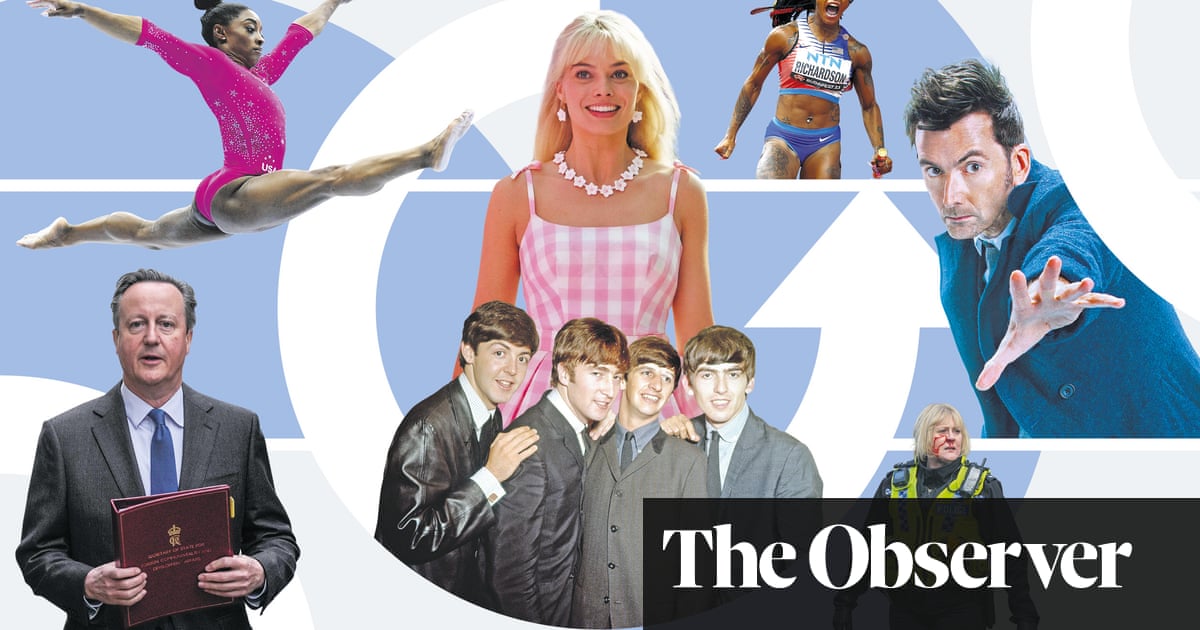
POLITICS
David Cameron
Somewhat oddly for a leader who had spent much of the latter part of 2023 trying to brand himself as the “change” prime minister, Rishi Sunak delved into the back catalogue of recent Tory PMs to freshen up his cabinet in November.
His big “reveal” was the return of David Cameron, the one-time Tory golden boy, who had quit in humiliation after calling and then losing the Brexit referendum in June 2016.
Cameron had once taunted Tony Blair late on in the Labour leader’s time at No 10 with the killer line “you were the future once”, only to see his own premiership bedevilled by European divisions before being prematurely destroyed by the people’s verdict on EU membership.
It is said that another ex-Tory leader, William Hague, helped Sunak persuade Cameron that a job in government as foreign secretary with a seat in the House of Lords was just what he and the ailing Conservative government needed.
Hague’s argument to his old friend was that a return might allow him to end his political career on a higher note, rather than always being remembered as the leader who left after a massive self-inflicted humiliation. Cameron is said to have become bored away from politics, working in his garden hut, and irritated that his legacy was so tainted. So Hague was pushing at a door that was already ajar.
Cameron’s return was controversial not only because of his involvement in the Lex Greensill lobbying scandal, but also his close links with China. But despite both, the broadly positive media response took the spotlight away from Sunak’s many domestic travails, for a few days at least.
Somewhat self-mockingly Cameron hit upon the title of Lord Cameron of Chipping Norton, after the posh social set of which he remains a central figure. But Ukraine, the Middle East, even Brussels beckon now, at least until the next general election, rather than parties with Rebekah Brooks, CEO of Sun and Times publisher News UK.
Also back: Nigel Farage Arguably the most influential UK politician of recent decades, Farage was back on our television screens, if not in politics. Not yet, fully, anyway. The former Ukip and Brexit party leader used his £1.5m appearance fee from ITV’s I’m a Celebrity … Get me Out of Here! to do more than merely make money. It was also clearly part of a mission to raise his profile again, before a general election, and at a time when many Tories are desperately looking out for a saviour.
In interviews after returning from the Australian jungle, Farage dismissed the notion of rejoining the Tories while Sunak was leader, but didn’t rule out doing so one day: “Never say never. I can’t predict right now what will happen.”
TELEVISION
Happy Valley
BBC One’s Bafta-garlanded Happy Valley was the most anticipated television comeback of 2023, returning for its third and final series seven years after the second, and series creator Sally Wainwright ensured Sergeant Catherine Cawood, as played by Sarah Lancashire, reappeared in all her redoubtable West Yorkshire glory.
In the opening moments, Cawood stomped across a drained mud-clagged reservoir, identified a putrefied corpse by its dentistry, humiliated smug male colleagues, then made her exit with a muttered derisive “Twats!” The Calder Valley phenomenon was back, though in terms of British cultural consciousness, it’s unclear whether Cawood or Happy Valley ever really went away.
The series may be British but it has long enjoyed international appeal – celebrity fans include Bob Dylan, Jamie Lee Curtis and comedian Amy Schumer– and global kudos – Lancashire recently won performance of the year at the Rose d’Or awards.
Its secret? A taut mesh of violent criminality, staunch integrity, flawless ensemble playing, and dust-dry northern humour. The dark jewel in the crown was the near-biblical conflict between Cawood and Tommy Lee Royce, played by James Norton, whom Cawood held responsible for her daughter’s death, and who was seeking to influence her grandson.
This was the battle – irredeemable psychopath versus incorruptible matriarch – that elevated the Happy Valley comeback to sure-fire event TV, drawing an audience of millions for the Cawood-Royce final reckoning. Nine years after it first appeared, the series left an imperishable legacy front-loaded by a no-nonsense game-changer of a female character. What will British television do without her? Barbara Ellen
Also back: David Tennant as Doctor Who In a move that will have Whovians discussing the impact on the canon for generations and regenerations to come, this year Tennant became the 10th and the 14th Doctor. Purists may be miffed, but his return – in episode The Star Beast – pulled in more than 9 million viewers. Jodie Whittaker’s final episode in the show was watched by 6.3 million.
CINEMA
Hayao Miyazaki of Studio Ghibli
Ten years ago, around the 2013 release of his film The Wind Rises, the animation legend Hayao Miyazaki announced his retirement. His statement prompted much fretful speculation among animation fans about who, if anyone, could shoulder the Studio Ghibli mantle and follow the man who created My Neighbour Totoro, Spirited Away and Princess Mononoke?
Miyazaki’s son, Gorō Miyazaki, was briefly touted, then rather ruled himself out of contention with the disappointing 2020 release Earwig and the Witch. But by this point, rumours had already started to circulate that Miyazaki senior’s retirement might not be quite as final as feared. It was confirmed in 2017 that Miyazaki was indeed working on another feature film which was at that point titled How Do You Live?
Details around the project were tantalisingly scarce, and so closely did Studio Ghibli guard the film that no trailer was released until a few days before the world premiere in Japan, and no advance press screenings held. Fans pored over a few enigmatic stills and the scantest plot description. All of which had the desired effect of building anticipation around the picture, retitled The Boy and the Heron, to fever pitch.
The visually dazzling fantasy adventure, with a story that straddles 1940s Japan and a magical parallel dimension, was the hottest ticket at the Toronto film festival in October, with punters queuing for hours in the hope of being among the first outside of Japan to watch it.
UK audiences will finally get to see the film on Boxing Day and should prepare for mystical realms, murderous parakeets and a return to the densely detailed mythic storytelling of classic Miyazaki.
Also back: Willy Wonka The conjuror-chocolatier in the frock coat and top hat makes a welcome return to the big screen: Timothée Chalamet breathes fresh life into the character of Roald Dahl’s Willy Wonka in Paul King’s exuberant prequel. The film follows a young Willy, an eccentric dreamer with a suitcase full of chocolate-making equipment, as he attempts to launch himself in a world of bespoke confectionery dominated by the nefarious chocolate cartel.Chalamet’s Wonka is a sweeter, less-jaded take on the character first played by Gene Wilder in 1971, and – fortunately – he’s nowhere near as skin-crawlingly creepy as the 2005 Johnny Depp version.
EUROPE
Donald Tusk, prime minister of Poland
There were more than a few groans when Donald Tusk returned to Poland after finishing his stint as European Council president and announced his intention to return to front-line domestic politics. But there was also some excitement – many people disliked Tusk, but as the rightwing, nationalist Law and Justice party continued dismantling democratic institutions, there were also some who said he was the only name big enough to take them on.
The latter group turned out to be right. Tusk fought a hard, passionate electoral campaign for the October vote that remained too close to call in opinion polls right up to polling day, but his Civic Coalition gained enough votes to be able to unite with two other opposition parties and form a government. In the end, it wasn’t even that close, a result in large part attributed to Tusk’s energetic campaigning and willingness to get out to smaller towns and the countryside, shedding some of his and his party’s reputation as being all about the metropolitan elites.
Sandwiched between disappointing election results for progressives in Slovakia and the Netherlands, Tusk’s win is a welcome reminder that Europe’s political direction is not all one-way, and that populist, nationalist parties can be defeated at the ballot box. His coalition will be broad and possibly unwieldy, and he is certainly not the fresh political face that many younger Poles crave to see running the country, but after eight years of Law and Justice, a Tusk government is likely to feel like a breath of fresh air.
LIFESTYLE
The colour pink
It was Pierpaolo Piccioli, creative director of fashion house Valentino, who brought pink back. His autumn-winter 2022-23 collection was limited to two colours: black and a specific hot pink which has now been added to Pantone’s official colour scale with the name Pink PP. At his show, Piccioli said “[Pink’s] a colour you can subvert, because it already has a lot of meaning. It was the colour of the power of men, then it became girlish … Today, it means different things.”
In 2023, this bubblegum shade meant red carpet glamour as celebrities from Viola Davis at the Met Gala and Stephanie Hsu at the Oscars to Jill Biden during her UK visit for King Charles’s coronation chose outfits in a colour that, until this year, was mainly found in the toddler aisle of Toys R Us. With the behemoth of Barbiecore, hot pink became part of the conversation around Greta Gerwig’s Barbie.
Like the highest grossing film of the year, pink is polarising. Is it liberating to reclaim it? Or just another consumerist attempt to sell misogyny disguised as feminism to a new audience? Against a social media backdrop where the world “girl” is used instead of “woman” – think the hashtags “girl dinner” and “girl maths” on TikTok – the jury is still out. Either way, in 2023 pink wasn’t so much about making the boys wink. It certainly made us think.
Also back: Pamela Anderson This year the Baywatch actor has enjoyed if not a revival then a retort to the way she was objectified during her 1990s heyday. January brought Pamela, A Love Story, an Emmy-nominated documentary which, Anderson said, let her “take control of the narrative for the first time”. This autumn she’s taken to turning up makeup-free to fashion events and she’s also announced that she’s selling all of her 90s wardrobe as she wants to “clear my mind, clear my closet, make room for new life”.
SPORT
Simone Biles
As the Tokyo Olympics faded into the background, for so long it was unclear if Simone Biles would ever be seen in competition again. Despite being heavily favoured to dominate, Tokyo turned into her nightmare. Biles was forced to withdraw from five of her six finals due to the twisties, a mental block that makes competing dangerous.
While the gymnastics community was sympathetic, many pundits branded Biles a “quitter”. Along with the general pressure from and the anxiety she felt while competing in empty stadiums without her family, Biles was still processing the trauma of being a sexual abuse survivor of Larry Nassar, the former team doctor of USA Gymnastics, and the only survivor still competing by 2021.
After the Olympics, Biles stepped away from the sport. Earlier this year, when her life seemed to be consumed by planning for her marriage to her partner, Jonathan, in April, there was little indication that Biles had made a decision on her career . At 26 years old, a true veteran in gymnastics, fans and experts began to wonder if she had decided to move on.
She had not. Biles had been secretly training for months and in June her name unexpectedly appeared on a list of participants at a USA Gymnastics training camp that week. Within days, her dominance seamlessly resumed. Biles won the competition, then obliterated her domestic rivals all summer.
At the world championships, Biles won gold medals in the all-around, team, balance beam and floor exercise competitions and a silver on the vault. She now holds the all-time gymnastics record for medals at the Olympics and world championships.
Alongside her medal haul, Biles finally clinched her fifth, and most daring, eponymous skill. On the vault, she landed the Yurchenko double pike vault at an international competition for the first time in her career. With every new achievement, Biles insisted she was back simply to ensure that she could finally find enjoyment in the sport she loves and to win for herself. Nobody else.
Also back: Elina Svitolina Ukraine’s most successful tennis player stepped away from her sport in March 2022, citing burnout. Svitolina and Gaël Monfils, her husband and fellow top tennis player, eventually announced that she would take an even longer hiatus as she was expecting their first child. In Svitolina’s time away from competition, Russia’s invasion of Ukraine continued to decimate parts of her country.
Svitolina’s return has been remarkable. Just a handful of events into her comeback, ranked No 508, the former No 3 won a WTA title in Strasbourg, which she immediately followed with a rousing run to the quarter-finals of the French Open. Weeks later Svitolina toppled the No 1, Iga Swiatek, on Centre Court en route to the semi-finals of Wimbledon. Now 29, Svitolina sees her goals as providing relief and inspiration to her country as it defends itself, and for her daughter, Skai.
Sha’Carri Richardson The US track star was one of the fastest women in the world after an incredible breakout season in 2021. Just as a showdown with the best seemed likely, though, disaster struck. Richardson tested positive for marijuana on the eve of the Olympic trials, ruling her out of the event and therefore Paris.
Richardson, 23, would become the butt of many internet jokes due to her over-exuberant attitude and her subsequent struggles in 2022. But this year, in her first world championships, she clinched gold in the 100m, to which she added gold in the 4x200m relay and then bronze in the 200m. Her year was ultimately defined by the mantra that she repeated when winning the US championships 100m title in July : “I’m not back, I’m better.”
TRAVEL
Sleeper trains in Europe
Night trains are reappearing across Europe as passengers opt for journeys that are greener than short-haul flights and also offer the old-school charm of traditional travel. While the UK has two sleeper trains – London to Scotland and London to Cornwall – many of the trans-European routes had stopped running over the last decade. But, in 2023, a range of night trains launched for the first time in years, including the Good Night train linking Brussels and Berlin via Amsterdam, and Nightjet’s new route from Munich and Vienna to Genoa, travelling via the beautiful coastal route of the Italian Cinque Terre area. Swedish company SJ also extended its Stockholm to Hamburg route to Berlin in April.
This comeback is only just getting started: in 2024, the Orient Express La Dolce Vita will launch, connecting Venice, Rome, Siena and the Italian Riviera. The French company Midnight Trains is also set to launch luxury trains linking Paris to 10 destinations including Edinburgh, Rome and Porto.
WILDLIFE
The York groundsel
One in six species of animals and plants may be at risk of extinction in Britain but one humble yellow flower came back from the dead this year. York groundsel was an urban flower that thrived on railway sidings and derelict land in the city of its name. It evolved into a new species over the past century after Oxford ragwort, a non-native flower, hybridised with native groundsel. It was discovered and given its scientific name, Senecio eboracensis, in 1979 – the first new species to have evolved in Britain for 50 years.
The plant’s success was short-lived though: the over-zealous application of weed killer saw it disappear as wild urban spaces were “tidied up” and built on. It was last seen in the wild in 1991.
Luckily, plant scientists kept three small specimens in pots on a windowsill in the University of York. When these died, a pinch of seed was harvested and lodged at Kew’s Millennium Seed Bank.
Tests found that very few of the tiny seeds germinated. Experts feared that the seed was reaching the end of its lifespan so botanists for Natural England, the government’s environmental watchdog, thought they would attempt to resurrect the species.
One hundred seeds were planted in a polytunnel at the Rare British Plants Nursery in Wales. To the botanists’ surprise, 98 seeds geminated successfully. More plants were propagated and fresh seed harvested.
In February this year, six grams of seed – potentially thousands of plants – were sown into special plots on council and Network Rail land in York. In May, the first plants in the wild for 32 years began to flower, bringing colour to the streets and railway sidings.
Conservationists warn that it is much more difficult and expensive to reintroduce species once they are gone – better to save them from going extinct in the first place. And this kind of “de-extinction” is unlikely to be replicated in Britain because York groundsel was the only globally extinct British plant that persisted in seed form.
Nevertheless, the success – and other revivals of extinct animals from white-tailed eagles to large blue butterflies – shows that lost species can be revived, even in one of the most nature-depleted nations on Earth.
TECH
Bitcoin
Investors in the world’s biggest cryptocurrency know a thing or two about changing fortunes. Last year’s high-profile bitcoin scandals, including the bankruptcy and felony charges brought against major crypto exchange FTX, saw the currency lose more than 60% of its value. Meanwhile, the slow implosion of NFTs only made onlookers even more wary of blockchain technology. By the end of the year, the mild interest that many conventional investors had shown across bitcoin’s lifespan appeared to have finally calcified into a healthy scepticism.
But if 2022 will be remembered as the year bitcoin lost its gloss, 2023 stands a chance of going down as the year it proved its resilience. The price of the cryptocurrency has more than doubled in the last 12 months, hitting a 20-month high in December. And that’s despite ongoing troubles: FTX founder Sam Bankman-Fried was found guilty of defrauding the platform’s customers in November, while crypto exchange Binance was fined $4.3bn after it pleaded guilty to money laundering. Advocates are framing the crackdown as a watershed for the industry, hoping it marks the departure of its more unscrupulous actors.
Elsewhere, bitcoin looks positioned to eke more credibility from financial markets. Investment companies such as BlackRock have filed to launch spot bitcoin exchange-traded funds – investment vehicles that hold bitcoins directly. It’s thought it will offer a regulated way of investing in the currency, and spare investors the fiddly business of managing the digital wallets and keys. Plenty still scoff at bitcoin’s future, but it’s presently enjoying quite the turnaround.
MUSIC
The Beatles
Now and Then was an apt title for the new(ish) Beatles song that brought the band back to the top of the UK charts 40-odd years after the murder of John Lennon. Technically part of pop’s past, the all-conquering Liverpool outfit remain an enduring reference point. The hit Get Back 2021 documentary series by Peter Jackson reframed the Beatles for fans old and new, preparing the ground for this latest resurgence.
Now and Then came thanks to advances in audio technology. The song formed part of a batch of Lennon sketches the surviving Beatles punched up into song form in the 90s. Then, it was impossible to extract a usable vocal from the 1979 Lennon piano demo; the track was shelved. But modern machine-assisted learning demixing software removed ambient noise from the tape.
Despite some consternation from fans about AI, Now and Then was no deepfake. It sounded eminently plausible. The late George Harrison’s guitar parts survived from the 90s. Ringo Starr re-did his drums; in tribute to Harrison, Paul McCartney wrote a new guitar solo that sounded so Harrison-esque even Starr was fooled.
Unity was a theme: producer Giles Martin – son of “fifth Beatle” George Martin – added in Fab backing vocals culled from other masters. Traditionalists might have balked, but modern pop is routinely spliced together this way, and the Beatles were always a very modern band. The result was a small, sentimental pleasure in a year full of conflicts whose regressiveness would have appalled the author of Give Peace a Chance.
Also back: Kylie Minogue The Australian singer has never really gone away in the UK. Her 2020 album Disco provided pure pandemic escapism. But this year she scored a world-slaying viral social media hit in the form of Padam Padam (in case you missed it: the sound of a beating heart). It was ubiquitous at Pride and, coming two decades after Can’t Get You Out of My Head, Padam suggested that a new generation of younger fans might not care how old female entertainers are any more. Could the glass mirrorball be shattering?
André 3000 The title of the first song on the Atlanta rapper’s surprise new release said it all: I Swear, I Really Wanted To Make A ‘Rap’ Album But This Is Literally The Way The Wind Blew Me This Time. Seventeen years on from OutKast’s last album, this huge star doubled down on his new obsession: the flute, in all its forms. Made with a collective of Los Angeles jazz musicians helmed by Carlos Niño, the meditative New Blue Sun invited listeners to shelve preconceptions and embrace reinvention.












